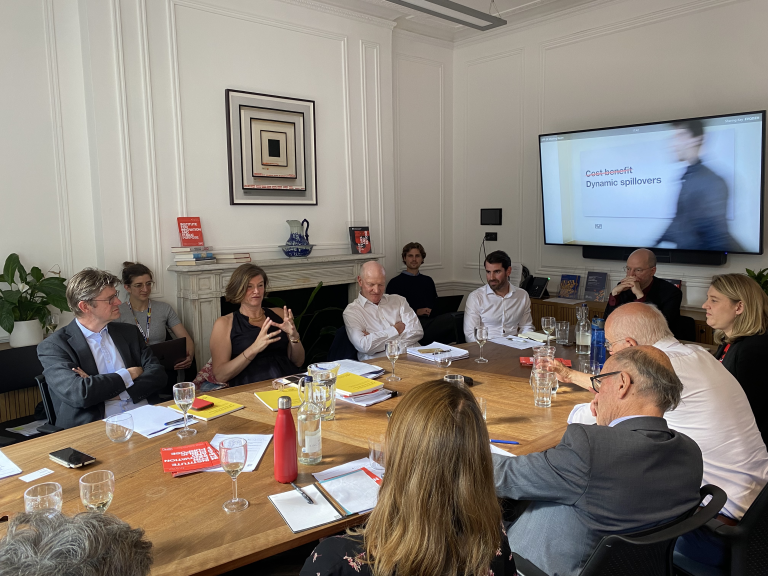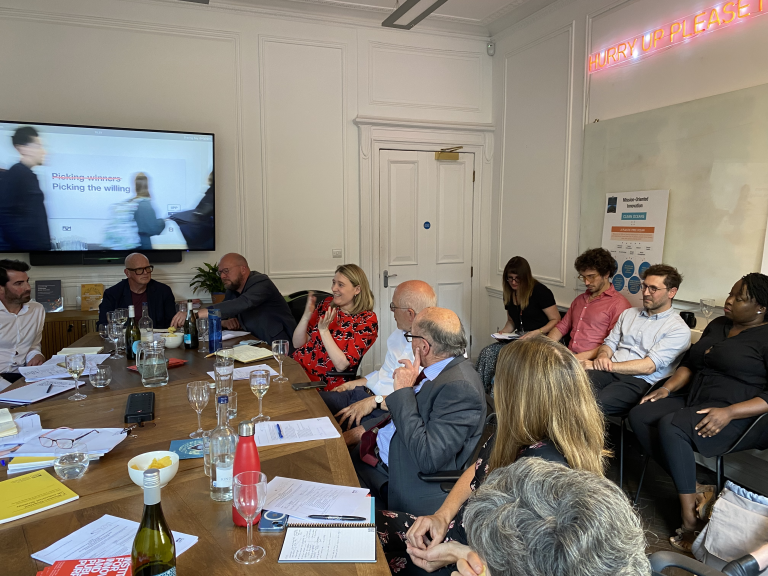IIPP reconvenes the UCL Mission Oriented Innovation and Industrial Strategy Commission
11 July 2023
IIPP organises the reunion for the commissioners from the Mission Oriented Innovation and Industrial Strategy Commission (MOIIS) to discuss the relevance of the Commission’s recommendations for the UK today.

On 6th July, IIPP organised a reunion for the commissioners from the Mission Oriented Innovation and Industrial Strategy Commission (MOIIS), along with additional guests, to discuss the relevance of the Commission’s recommendations for the UK today and what lessons have been learnt from those who had worked to put a mission-driven approach into practice.
This workshop was convened by Professor Mariana Mazzucato, Director of the UCL Institute for Innovation and Public Purpose and former co-chair of the MOIIS Commission, and the Rt Hon Greg Clark MP, former Secretary of State for Business, Energy and Industrial Strategy. It was attended by the following Commission members:
- Mr Theo Blackwell MBS, Chief Digital Officer, Greater London Authority;
- Mr Mike Bracken CBS, Founding Partner, Public Digital;
- Prof. Paul Ekins, Professor of Resources and Environment Policy in the Bartlett School Environment, Energy and Resources, UCL;
- Prof. Sue Himmelweit, Professor of Economics at The Open University;
- Prof. Daniel Hochhauser, Kathleen Ferrier Professor of Medical Oncology, UCL Cancer Institute;
- Mr Charles Leadbeater, Senior Associate, System Innovation Initiative;
- Lord David Willetts FRS, President of the Resolution Foundation and former Co-Chair of the MOIIS Commission.
A few key guests from beyond the Commission were also invited to share their insights, from across parties and organisations. These included, for example: Mrs Sarah Chaytor, Director of Strategy and Policy, UCL; Councillor Georgia Gould, Leader of Camden Council; Mr Ted Hayden, Director of the Government Office for Science, UK Government, alongside IIPP Faculty members, MPA and PhD students.

Councillor Georgia Gould, Leader of Camden Council discusses the benefits of the mission-oriented approach for local government with the Commission members
The MOIIS Commission ran from 2018-19, and was instrumental in informing the UK Government’s Challenge-oriented Industrial Strategy at that time. The Commission put forward four draft missions in its final report, A Mission-Oriented UK Industrial Strategy, based on the challenges highlighted in this strategy:
- Clean Growth: “At least halve the energy and resource use of new and existing buildings by 2030.”
- AI and Data Economy: “Use data, artificial intelligence and innovation to transform the prevention, early diagnosis and treatment of chronic diseases by 2030, through the adoption of interoperable AI and data tools and standards.”
- Ageing Society: “To enhance capabilities and quality of life through our increasingly longer lives.”
- Future of Mobility: “By 2040 to put the UK at the forefront of safe, sustainable, universally accessible travel, creating congestion- and emission-free, zero accident systems.”
The group reflected that the challenges that had been chosen still felt pertinent, although framing the ‘aging’ challenge in a positive way – perhaps around the goal of health for all – would have made this mission stronger. Unfortunately, due in part to Brexit, the COVID pandemic, and geopolitical dynamics, the UK Government did not bring as much focus to bear on these challenges as originally hoped. Multiple changes in political leadership have also meant that the challenge-oriented strategy has since been retired.
The discussion was wide ranging, but a common theme was the challenge of implementing missions. The question of the ‘how’ is central to ensuring that challenge- or mission-oriented strategies are more than new language describing business as usual. A mission-oriented industrial strategy has to mean changes in the approach to policy tools including procurement, new institutions or teams with the capabilities for delivery, and evaluation methods.
With the global resurgence of industrial policy – especially in the US and the EU – the UK is under increasing pressure to come up with a coherent, forward-looking, long-term strategy that supports inclusive, broad-based growth. The Commission’s work is more relevant today than ever. IIPP and MOIIS Commissioners are exploring opportunities to carry its recommendations forward.
 Close
Close

